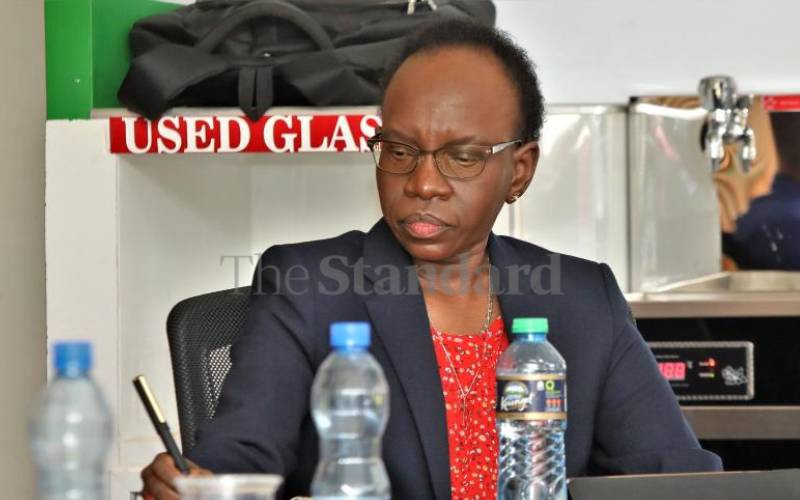 |
|
Jacob Kaimenyi at a past event. [PHOTOS: FILE/STANDARD] |
By MARK KAPCHANGA
The roll-out of the Sh24 billion laptop project for primary schools may take a little longer as the Government seeks to come out with the “best deal” for Kenyans.
Education Cabinet Secretary Jacob Kaimenyi says an ambitious due diligence process is underway in home countries of the three firms — India-based Olive Telecommunications, Haier Electrical Appliances Corporation of China and United States’ Hewlett Packard — that have been shortlisted to supply 1.28 million laptops to primary schools.
Contrary to reports that one of the firms had been given the nod to supply the laptops, Prof Kaimenyi says the Government has not yet awarded any tender to any of the shortlisted companies.
“We are in the process of establishing if these companies have the capacity to manufacture the gadgets,” he said.
In October, the Government cancelled the laptop project tender due to overpricing. At that time, the lowest bidder quoted Sh32 billion against an anticipated budget of Sh20 billion. The entire project is estimated to cost some Sh50 billion, targeting more than 1.3 million pupils in public primary schools.
However, in the renewed tender, Olive Telcoms quoted Sh22 billion, translating to Sh18,011 per gadget. Hewlett Packard’s bid price came second at Sh23 billion, while Haire quoted Sh24 billion, meaning it would be selling the laptops at Sh19,256 a piece.
Sources say the negotiated price covers the cost of supplying the 20,637 laptops for teachers, and will have more than Sh10 billion of taxpayers’ money saved as compared to the last tender.
Educational videos
In the current financial year, only Sh17.5 billion was set aside for the laptop project, which includes the cost of infrastructure development to facilitate the project. According to the ministry’s initial plan, Sh9.8 billion would be used to buy the laptops, Sh800 million for training, Sh500 million for digital content and Sh5.8 billion for constructing computer laboratories in 10 primary schools in each constituency.
Sixteen companies, including Kenyan suppliers, had placed bids for the project.
Parliamentary Committee on Education Chairperson Sabina Chege said they would be waiting for the due diligence report from the team that left the country last week. “It is not very clear when we will have the report, but we know we will have the laptops in schools by the end of March or early April,” she said.
According to Ms Chege, Kenyans should expect value for their money as the Government opted to deal with manufacturers who will deliver the gadgets to the district level. “It was the best idea, as we won’t be dealing with profit-hungry middlemen. These manufacturers will be responsible for the state of the machines and thus we may spend little or nothing on maintenance costs,” said Ms Chege.
Even as the Government and Parliament show confidence over the project, critics say the process has not been as transparent as was expected. They further fear that despite Olive being the lowest bidder, it may not have the capacity to supply the required machines.
But Olive Telecomunications Director of Sales Ajay Jain argues that they have a solid ability to supply the laptops at the county level across the country. According to Mr Jain, the company has partnered with fast-growing Chinese firm, the New Century Optronics, to participate in the tender for the supply of the 1.2 million laptops. He claims they have had a similar experience in Central Asia, where they partnered with Uzbek Telecom to offer cutting-edge education solutions. “We have developed education platform that includes end-to-end solution for teachers and students. The education platform enables Olive Telecommunications to create smart courses from raw content. It will bring together authors, distributors and students,” he said.
Stay informed. Subscribe to our newsletter
Documents in our possession show that Olive Telecommunications told the Government that it would also set up an academy where students would access thousands of free educational videos from international publishers such as Pearsons, Everonn Education Limited, Cambridge University Press and Britannica.
It is not clear if the Shandong-headquartered Haier Electricals has any experience in providing education solutions. According to its website, the products the firm deals with are air conditioners, mobile phones, computers, microwave ovens, washing machines, refrigerators and televisions.
In 2011, the firm had the world’s largest market share in white goods, with 7.8 per cent. In Africa, Haier says it has plants in Tunisia, Nigeria, Egypt, Algeria and South Africa. It claims to be technically a collective company, meaning it is owned by employees, though none has ever received any dividends.
 The Standard Group Plc is a
multi-media organization with investments in media platforms spanning newspaper
print operations, television, radio broadcasting, digital and online services. The
Standard Group is recognized as a leading multi-media house in Kenya with a key
influence in matters of national and international interest.
The Standard Group Plc is a
multi-media organization with investments in media platforms spanning newspaper
print operations, television, radio broadcasting, digital and online services. The
Standard Group is recognized as a leading multi-media house in Kenya with a key
influence in matters of national and international interest.
 The Standard Group Plc is a
multi-media organization with investments in media platforms spanning newspaper
print operations, television, radio broadcasting, digital and online services. The
Standard Group is recognized as a leading multi-media house in Kenya with a key
influence in matters of national and international interest.
The Standard Group Plc is a
multi-media organization with investments in media platforms spanning newspaper
print operations, television, radio broadcasting, digital and online services. The
Standard Group is recognized as a leading multi-media house in Kenya with a key
influence in matters of national and international interest.









